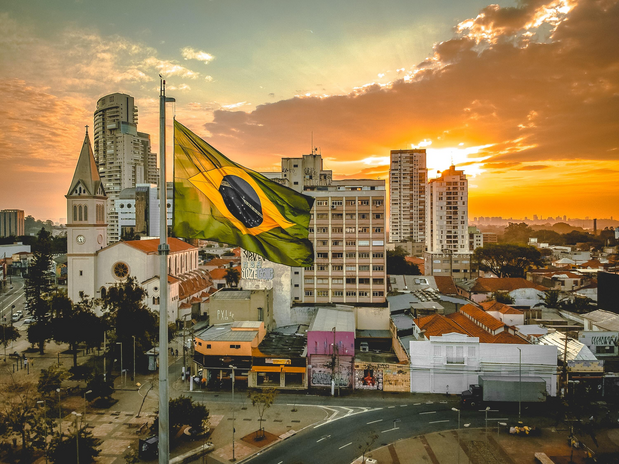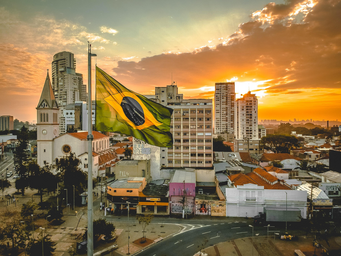The article below was written by Lara Sanchez and edited by Carolina Rodrigues. Liked this type of content? Check out Her Campus at Cásper Líbero homepage for more!
Carlos Marighella is the face and name of Revolution and resistance in Brazil — leninist-marxist leader, a black Italian-Brazilian man who never hesitated to fight the elitist interests imposed by the government. A “bandid of my color, new Messiah”, as Racionais MC’s would say. The man who encouraged a whole opposition with his sayings: “it’s needed not to be afraid. It’s needed to have the courage to say.”
A movie portraying the history of the guerrilla was produced in 2019 by the actor, director and writer Wagner Moura and released by Paris Filmes and Downtown Filmes, but there was an issue with ANCINE (National Agency of Cinema in Brazil) — which was considered an attemption of censorship — that made the film be postponed to 2020.
Then, due to the COVID-19 pandemics, its first run in Brazil was once again rescheduled. What was supposed to be launched at 2019’s Black Conscience Day was only released two years later, on November 4th 2021, in honor of Marighella’s 52th death anniversary. This opened up space to new discussions involving the politician, writer and communist militant. But who, indeed, was Carlos Marighella?
Son of Augusto Marighella, Italian immigrant and anarchist, and Maria Rita do Nascimento, Brazilian worker who was born in the year of the “Golden Law” (or “Lei Áurea”, signed by Brazilian princess Isabel) and daughter and granddaughter of slaves, he became famous during the military dictatorship in Brazil for leading the biggest armed opposition, being told as the biggest enemy of the dictatorship.
Carlos Marighella was born in 1911 in the city of Salvador, Bahia, northwest of Brazil. He went in his 18’s to school of engineering and then became affiliated to Brazilian Communist Party (PCB), in which he started his political life. Not only was he a politician, but also a poet — a lot of his writings made explicit his views: he first went to prison in 1932, after writing a poem criticizing Bahia’s interventor, during Getúlio Vargas dictatorship.
When he moved to São Paulo, he started to act against Vargas’ repression and reorganize the communists revolutionaries. He went back to prison for DOPS (Social and Politics Order Delegacy) in 1939, where he was tortured, but yet refused to give them any information about the communists’ plans. He was sent to Noronha’s prison and there organized an educational and political program for his jail partners.
When pardoned and freed again, in April 1945, he became an important figure on Brazil’s redemocratization, being elected as a legal parliamentarian for Communist Party in Bahia. However, it only lasted 3 years — president Gaspar Dutra made him (and all communists) clandestine again. He kept involving himself with popular movements and directioned his beliefs to land reform.
It was in the year of the military coup (1964) that he was arrested once again, but this time it was different — he was about to become the government biggest, most dreaded and most chased enemy. In his defense, he also attacked and exposed the dictatorship’s crimes and horrors.
It was this strategy that made people see what was happening: the militaries were even cornered at this point, having to accept an habeas corpus that, over again, freed Marighella immediately. His ways of dealing with prisons and resistance strategies attracted a whole crowd that was willing to fight the regime.
Although this will of revolution has brought a national sense of opposition and a relevant growth of revolutionary communist ideas, which would be the only capable way of defeating the illegal and illegitimate government that was instituted in Brazil, it also brought Marighella some party issues — he went into dissonance with PCB and even criticized them, alleging an immobility was dominating the Party, which caused his shutdown from the organization.
Some of the current PCB affiliates think that Marighella missed a sense of strategy that the Party was trying to execute, despite they are conscious he was, undoubtedly, the most important figure in combat to the regime — he also brought the Communist Party, that always used to be repressed for the “radical ideas”, an honorable notoriety.
He, shut off from the Party that did not agree with the decision of fighting along with the great mass, founded ALN – “Ação Libertadora Nacional” (National Liberating Action). It was an armed organization that fought, in fists, the regime keepers. However, in November 1969, he was cowardly murdered by the military agents, who prepared him an ambush that he never escaped. He was shot until death, but his legacy remains on his writings and studies and on works that refer to him — including, obviously, the movie Marighella.
The man who was brave enough to fight and to encourage others might have been murdered, but he lives in metaphorical terms: his courage is still in brave youth hearts that, just like him, fight for freedom and for the end of inequality and repression.
His pieces of work contain a bias of history that truly represents the actual History: the countless cries for justice along the years of resistance. He talks passionately about freedom, democracy, political Party, represents and honors memorable figures as Luís Carlos Prestes, explains the crisis Brazil has been through, defends marxist thesis, etc.
Mini-Manual do Guerrilheiro Urbano, for example, it is a book written by Marighella and one of the most famous works considered by conservative and military views as a terrorism allegory. That might be the proof that Carlos Marighella was right when he said fighting was the only efficient way to pull down oppression.


